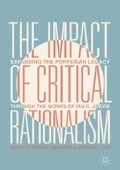Abstract
The most significant basic difference between the scientist and the engineer, Agassi and Jarvie have argued, is that the former seeks true explanations of reality, whereas the latter seeks effective control over it. Since control is often achievable with little or no understanding of underlying principles, this difference is of considerable methodological significance. Confusingly, however, Popper seems to have recommended to explorers of the social realms to limit themselves to piecemeal social engineering. Are social scientists engineers, or a crossbreed between engineers and scientists? Are their methodological challenges different from those of natural scientists proper? Jarvie’s work on technology and the social sciences explores the answers to these questions.
Access this chapter
Tax calculation will be finalised at checkout
Purchases are for personal use only
Notes
- 1.
See, for example, the interesting early collection of essays Applied Science and Technological Progress, published by The National Academy of Sciences in 1967, and especially C.S. Smith’s paper discussed in the following pages. See https://books.google.co.il/books?id=BTcrAAAAYAAJ&printsec=frontcover&dq=inauthor:%22National+Academy+of+Sciences#v=onepage&q&f=false.
- 2.
Agassi (1971) argues that metaphysical frameworks render some generalizations of natural laws and other uninteresting trends. Would Popper concur? Let us assume that he would. Would this have led him to reformulate his abovementioned Section 27 of Poverty? It is extremely difficult to answer these questions.
References
Agassi, Joseph. 1971. What Is a Natural Law? Studium Generale 24: 1051–1066.
———. 1974. The Confusion Between Science and Technology. In Contributions to a Philosophy of Technology, ed. F. Rapp, 40–60. Dordrecht, Holland: D. Reidel.
———. 1985. Technology: Philosophical and Social Aspects. Dordrecht, Holland: Kluwer.
———. 2003. The Impact of Auschwitz and Hiroshima on Scientific Culture (in Hebrew). In Conversation and Discourse, ed. Noa Naaman-Zauderer and Yaron Sanderowitz. Tel Aviv-Yafo: Tel Aviv University.
Agassi, Joseph, and Ian C. Jarvie. 1973. Magic and Rationality Again. The British Journal of Sociology 24: 236–245.
Bar-Am, Nimrod. 2014. The Structure of Scientific Revolutions, 50th Anniversary Edition. Philosophy of the Social Sciences 44 (5): 688–701.
Jarvie, Ian C. 1974. The Social Character of Technological Problems. In Contributions to a Philosophy of Technology, ed. Friedrich Rapp, 86–92. Dordrecht, Holland: D. Reidel.
———. 1982. Popper on the Difference Between the Natural and the Social Sciences. In In Pursuit of Truth, ed. Paul Levinson, 83–107. New Jersey: Humanities Press.
———. 1986. Thinking About Society: Theory and Practice. Dordrecht, Holland: D. Reidel.
Polanyi, Michael. 1958. Personal Knowledge: Towards a Post-Critical Philosophy. London: Routledge and Kegan Paul.
Popper, Karl R. 1945. The Open Society and Its Enemies. Vol. 2. London: Routledge.
———. 1961 [1957]. The Poverty of Historicism. London: Routledge.
Price, Derek. 1968. The Differences Between Science and Technology. Thomas Alva Edison Foundation.
Rapp, Friedrich. 1974. Contributions to a Philosophy of Technology. Dordrecht, Holland: D. Reidel.
Ryle, Gilbert. 1949. The Concept of Mind. London: Hutchinson.
Smith, Cyril S. 1967. A Historical View of One Area of Applied Science—Metallurgy, Applied Science and Technological Progress, The National Academy of Sciences, 57–71.
Author information
Authors and Affiliations
Editor information
Editors and Affiliations
Rights and permissions
Copyright information
© 2019 The Author(s)
About this chapter
Cite this chapter
Bar-Am, N. (2019). How Should Social Engineers Develop Critical Social Science?. In: Sassower, R., Laor, N. (eds) The Impact of Critical Rationalism. Palgrave Macmillan, Cham. https://doi.org/10.1007/978-3-319-90826-7_2
Download citation
DOI: https://doi.org/10.1007/978-3-319-90826-7_2
Published:
Publisher Name: Palgrave Macmillan, Cham
Print ISBN: 978-3-319-90825-0
Online ISBN: 978-3-319-90826-7
eBook Packages: Social SciencesSocial Sciences (R0)

